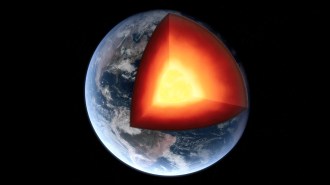- More than 2 years ago
A stalagmite’s past may help reveal Earth’s future. By studying Siberian cave formations as old as 500,000 years, researchers have found that even moderate climate warming may set off significant thawing of permafrost.


If such extensive thawing of frozen soil occurred today, it could trigger a massive release of greenhouse gases, scientists report online February 21 in Science. Permafrost locks in huge amounts of carbon, so if the frozen ground thaws, much of the carbon could convert to carbon dioxide and methane and boost global warming.
During an era with average temperatures just 1.5 degrees Celsius warmer than preindustrial times, permafrost melted in areas that today are frozen year-round, the researchers report. Alarmingly, this melting came with a change in climate less than the 2 degrees that the United Nations has set as a target for averting catastrophic effects of warming, says Ted Schuur of the University of Florida, Gainesville, who was not involved in the study.
The new research, he says, is the first to shed light on permafrost from hundreds of thousands of years ago. “It’s nice to look back in the past and see what’s already happened on the Earth, and that gives us some confidence about our future predictions,” Schuur says.
Researchers can use soil and ice to calculate the age of existing — but not past — permafrost.
Anton Vaks of the University of Oxford and an international team probed what happened to permafrost in warmer climates long ago by studying speleothems, ancient cave formations that include stalactites on cave ceilings and stalagmites on cave floors. These formations grow as mineral-laden water seeps into caves. In areas with permafrost, that only happens when the climate is warm enough to cause thawing, the researchers say. So determining the age of speleothem layers gave the researchers an indirect way to study ancient thawing permafrost.
Vaks and his team sampled speleothems from six caves along a path from northern Siberia south to the Gobi Desert. They dated layers going back 500,000 years by measuring the amounts of certain radioactive elements within the layers.
In nearly all of the warm periods studied, layers grew on speleothems in areas that today have partial permafrost cover, the researchers found. During the warmest period studied, some 400,000 years ago, global temperature was 1.5 degrees higher than in preindustrial times. Only during that period did speleothems grow in the cave farthest to the north.
That suggests that 1.5 degrees of warming was enough to thaw permafrost even in areas that are fully covered today. And the finding implies the same could happen in the future, says George Kling of the University of Michigan in Ann Arbor. “Our challenge is to predict how much and how fast the carbon currently frozen in permafrost will enter the atmosphere,” he says.
Vladimir Romanovsky of the University of Alaska Fairbanks praises the study but warns against generalizing its findings to permafrost in other regions of the globe, noting that the method has some uncertainty. “Permafrost could be only one of the possible causes of growing or not growing of speleothems.” One possibility is that fractures in still-frozen permafrost could allow water to seep through, he says.
Another concern is that the method the researchers used might not detect partial thawing. If that had happened, water may not have reached caves, and speleothems would not have grown, Romanovsky says. But even partial thawing could change the climate, he warns, by turning previously locked-up carbon into greenhouse gases.







